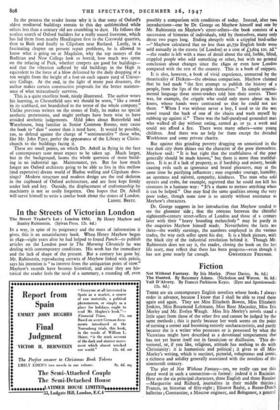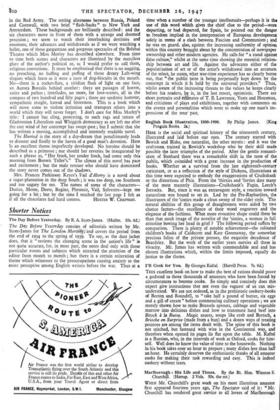Fiction
THERE are six contemporary English novelists whose books I always order in advance, because I know that I shall be able to read them again and again. They are Miss Elizabeth .Bowen, Miss Elizabeth Jenkins, Miss Rosamond Lehmann, Miss Rose Macaulay, Miss Iris Morley and Mr. Evelyn Waugh. Miss Iris Morley's novels stand a little apart from those of the other five and cannot be judged by the same methods ; this is partly because her work seems on the point of turning a corner and becoming entirely uncharacteristic, and partly because she is a writer who possesses or is possessed by what the Victorians might have described as a devotional temperament that has not yet burnt itself out in fanaticism or disillusion. This de- votional, or, if you like, religious, attitude has nothing to do with Christianity: it is humanistic and political ; it gives to all Miss Morley's writing, which is succinct, pictorial, voluptuous and ironic, a richness and solidity generally associated with the novelists of the nineteenth century.
The plot of Not Without Fantasy—yes,. we really can use this dated word in such a connection—is formal: indeed it is Racinian.
Here are the six principal characters, three English and three Russian —Marguerite and Richard, journalists in their middle thirties ; Francis, an historian of fifty-eight ; Elisavet Raalst, a Russo-Dutch ballerina ; Constantine, a Moscow engineer, and Bologanov, a general in the Red Army. The setting alternates between Russia, Poland and Cornwall, with two brief " flash-backs " to New York and Amsterdam. These backgrounds are brilliantly described: and the six characters move in front of them with a strange and doomed precision ; we• seem to watch their interlocking destinies and emotions, their advances and withdrawals as if we were watching a ballet, one of those gargantuan and gorgeous spectacles of the Bolshoi Theatre which Miss Morley has described elsewhere. From time to time both scenes and characters are illumined by the merciless glare of the author's political or, as I would prefer to call them, religious convictions. It must be emphasised that there is no nagging, no preaching, no huffing and puffing of those dreary Left-wing slogans which leave as it were a taste of dog-biscuits in the mouth. No—there is a rocket-flare, a viridian flash of light on one face, an Aurora Borealis behind another: there are passages of horror, satire and pathos ; interludes, no more, for love-scenes, all in the compass of two hundred and fifty pages ; there are sardonic humour, sympathetic insight, hatred and bitterness. This is a book which will move some to violent irritation and transport others into a world which they will never forget. I don't care for Miss Morley's title : I cannot but cling, protesting, to such rags and tatters of Gladstonian Liberalism and Whiggish democracy as are left me after the east wind of her contempt has swept.past ; but I submit that she has written a moving, accomplished and intensely readable novel.
The Hunted is the story of a day-dream that penultimately leads to disaster and finally to the haven of a good man's devotion. Here is an excellent theme imperfectly developed. No heroine should be described as a primrose ; nor should her reveries be inaugurated by such a phrase as, "Her frock, her tender frock, had come only this morning from Bonwit Teller's." The climax of this novel has pace and excitement ; but the male rescuer who should have dominated the story never comes out of the shadows.
Mrs. Frances Parkinson Keyes's Vail d'Alvery is a novel about a sugar-plantation in the deep South ; it was too deep, too Southern and too sugary for me. The names of some of the characters— Dunce, Meme, Deete, Regine, Phronsie, Vail, Sylvestre—kept me going for a bit ; but by the time I reached the last page I felt as if all the chocolates had hard centres. HESTER W. CHAPMAN.































 Previous page
Previous page